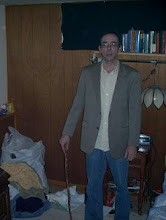A Gentle Tap
Patrick Kurp quotes the following Samuel Beckett passage and discusses it with odd, pedantic delight.
A writer is imagining a character he is going to create:
"It is right that he too should have his little chronicle, his memories, his reason, and be able to recognize the good in the bad, the bad in the worst, and so grow gently old down all the unchanging days, and die one day like any other day, only shorter."
I have to let Kurp do the talking here.
"The bad in the worst" hints that something else is going on, something more subversive, and only with that final phrase does the punchline, the booby trap, go off."
It's an impish joke. I don't know why I laughed out loud and I probably wouldn't have if not for re-reading and wondering if there is something self-effacing that the writer believes his character will merely see "the bad in the worst". Probably though he means for his character to be shallow, so the author himself can be wiser.
The character would indeed be a character. His writer promises to be very good company, keen and critical, laconically exacting, but comfortably tipsy.
___
I grouch about literature sometimes because I feel like a pearl diver who isn't quite sure why a pearl is valuable. Kurp's having to lead me me through that sentence doesn't bother me though. I do love the written word, and it is always worthwhile to witness genius.
Maybe Kurp is the genius. Some have said that today's critics are the true artists, in their mining for that mysterious quality/ virtue we call "Art".
Back to the joke, or "booby trap". Something makes me think my maternal grandmother would have smiled and read it aloud to someone. She'd have been happy doing that. But it would be irritating having to explain.
"Well, see, the day you die will be like any other day probably but since you're going to die it will be shorter, oh never mind I guess you had to be there!" (Then she would laugh again, this time at her own joke.)







0 Comments:
Post a Comment
<< Home